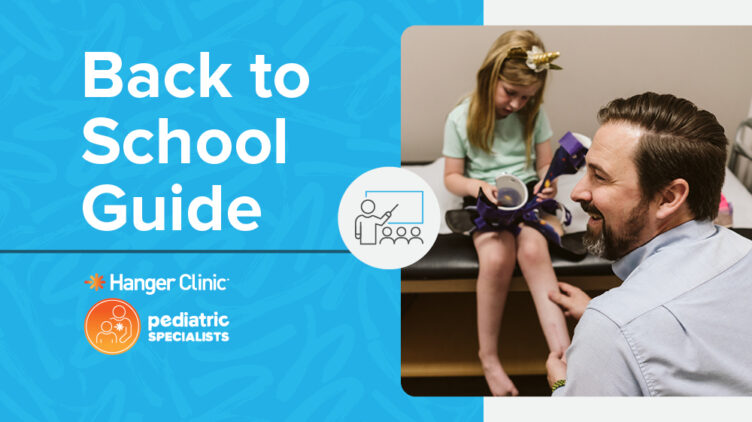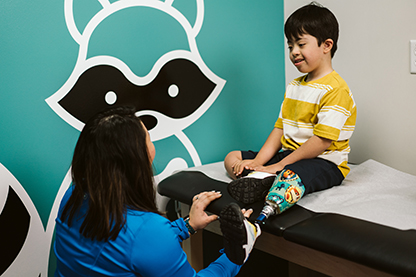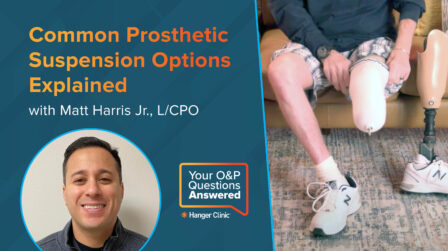Back to School Guide: Orthotic and Prosthetic Tips

It’s that time of year again! Your child is preparing to go back to school with their orthosis or prosthesis. Whether your child is going back to school for the first time with their device, or has been down this path before, here are some tips we suggest to help set your child up for success.
Schedule an Appointment with Your Clinician
Children grow quickly. If you have any concerns with the fit of your child’s orthosis or prosthesis, schedule an appointment for your child to be seen by their orthotist or prosthetist. Also, if your child works with an occupational therapist (OT) or physical therapist (PT), they can be an added resource for your child’s needs and possibly help assist with a plan for the upcoming school year.
Talk with Your Child
It’s common at the start of the school year for children to be excited about returning to school. Before school begins, consider taking some time to talk with your child about their orthosis or prothesis so they can feel prepared to share with other students its purpose and how it helps them.
Meet with School Teachers
Prior to the beginning of the school year, consider scheduling a meeting with your child’s teacher(s) to introduce your child and review your child’s history, accommodations, and needs. In general, when a teacher is more comfortable with your child’s orthosis or prothesis, the students in the class will be more likely to follow.
You may want to discuss with the teacher(s) at this meeting how they plan to introduce students and if your child would like to share about their orthosis or prosthesis with other children in the class. In addition to your child’s main teachers, also consider music, library, physical education, or other teachers to discuss any accommodations.
Back to School Guide
Keep these back to school tips easily accessible as you start the new school year.

Meet with School Staff
In addition to meeting teachers, it may be important to meet with the principal, school advisors, counselors, security, and custodial staff. The staff will interface with your children outside of the classroom and during transition times.
Review Attendance Policies
Your child may need rest breaks during the day. Discuss with the staff how your child can make them aware of the need for a break and where they may go to rest. Additionally, your child may be absent due to medical appointments or other unforeseen circumstances. Discuss how to address these absences and keep your child on task in the classroom.
Identify School Modification Needs
Prior to the school year, if your child is attending a new school or would like to revisit their current school, consider setting up a time for your child to walk through the school to ensure the classrooms, bathrooms, lunch rooms, school buses, and playground equipment are safe and accessible. Identify routes through the school for shorter transition time and easier accessibility for the new school year.
Take into consideration if any special equipment needs to be installed or guidelines made. Doing this ahead of time can help prevent accidents and ease accessibility. Also, for emergency drills or situations, consider reviewing any specific plans of action to best keep your child prepared and safe.
Visit School Nurse and Discuss Medication Management
Take time to meet the school nurse to share more about your child’s orthotic or prosthetic device, review removing and putting on the device, discuss what to look for if your child complains of pain from the device, and discuss any pain or medication management that may be needed.
Inquire About School Aide Assistance
If your child would benefit from a school aide, find out if this is something your school currently offers or would help to arrange for your child. A school aide can help your child navigate during transition times, carry books to and from class, help your child get set up in the lunch room, and more.
Field Trips and After School Activities
Before the school year starts, ask about field trips and discuss if any arrangements are needed. Also, remember to consider involving your child in after school clubs, sports, and programs.
Remember, helping your child feel prepared for the upcoming school year helps to support an easier transition time for your child. With today’s orthotic and prosthetic technology, your child has many opportunities to do what they love. Just remember, work to keep open lines of communication with not only the school, but also with your child. You are your child’s best advocate and have an opportunity to teach your child to advocate for themselves. The possibilities are limitless!
Request a Free Evaluation
If you or someone you love are looking for personalized, high-quality care, get in touch with a board-certified orthotist or prosthetist at a Hanger Clinic near you.
- Limbs4Kids, Returning to School After a Limb Amputation
- Knit Rite, Back to School Tips for Parents of Amputee Kiddos
- New Hampshire Family Voices Limb Loss Education & Awareness Program, LLEEAP Manual
Latest Updates
Subscribe to stay up-to-date on our latest posts.



